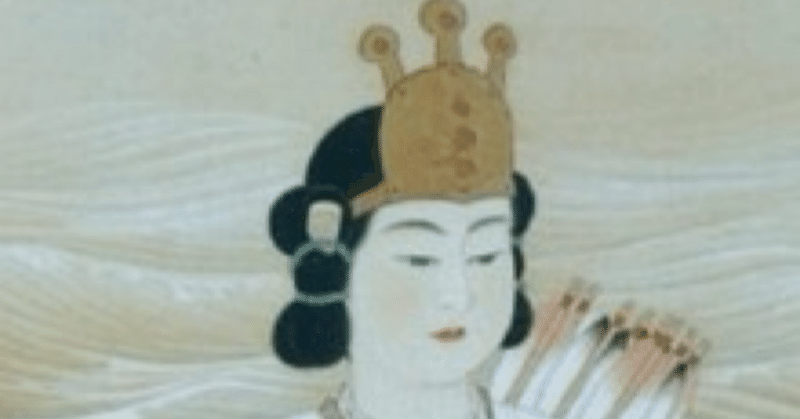
くChatGPTの『日本書紀』英訳 神功皇后 5
『日本書紀』神功皇后 5
冬十月己亥朔辛丑、從和珥津發之。時、飛廉起風、陽侯舉浪、海中大魚、悉浮扶船。則大風順吹、帆舶隨波、不勞㯭楫、便到新羅。時、隨船潮浪遠逮國中、卽知、天神地祇悉助歟。新羅王於是、戰々慄々、厝身無所、則集諸人曰「新羅之建國以來、未嘗聞海水凌國。若天運盡之、國爲海乎。」是言未訖間、船師滿海、旌旗耀日、鼓吹起聲、山川悉振。新羅王遙望、以爲、非常之兵、將滅己國。讋焉失志、乃今醒之曰「吾聞、東有神國、謂日本。亦有聖王、謂天皇。必其國之神兵也。豈可舉兵以距乎。」卽素旆而自服、素組以面縛、封圖籍、降於王船之前。因以、叩頭之曰「從今以後、長與乾坤、伏爲飼部。其不乾船柂而春秋獻馬梳及馬鞭、復不煩海遠以毎年貢男女之調。」
則重誓之曰「非東日更出西、且除阿利那禮河返以之逆流及河石昇爲星辰而殊闕春秋之朝、怠廢梳鞭之貢、天神地祇共討焉。」時或曰「欲誅新羅王。」於是、皇后曰「初承神教、將授金銀之國。又號令三軍曰、勿殺自服。今既獲財國、亦人自降服。殺之不祥。」乃解其縛爲飼部。遂入其國中、封重寶府庫、收圖籍文書。卽以皇后所杖矛、樹於新羅王門、爲後葉之印、故其矛今猶樹于新羅王之門也。
爰新羅王波沙寐錦、卽以微叱己知波珍干岐爲質、仍齎金銀彩色及綾・羅・縑絹、載于八十艘船、令從官軍。是以、新羅王常以八十船之調貢于日本國、其是之緣也。於是、高麗・百濟二國王、聞新羅收圖籍降於日本國、密令伺其軍勢、則知不可勝、自來于營外、叩頭而款曰「從今以後、永稱西蕃、不絶朝貢。」故因以、定內官家屯倉。是所謂之三韓也。
≪英訳≫
In October, on the third day of winter, they departed from Waniura. At that time, the god of wind stirred the winds, the god of waves raised the waves, and the great fish of the sea all surfaced to aid the ship. Favorable winds blew, and the sailboat was carried by the waves, reaching Silla without the need for rudder or oars.
Upon their arrival, the waves carrying the ship reached into the heart of the country. It seemed as if the heavenly and earthly gods were assisting them. The king of Silla, stricken with terror, did not know what to do.
Gathering many people, he said, “Since the founding of Silla, we have never heard of seawater coming inland. Perhaps our fate has run its course, and our country will become the sea.” Before he could finish, military ships filled the sea, their flags shining in the sun, and the sound of drums and flutes echoed through the mountains and rivers. From afar, the king of Silla saw the formidable forces and feared that a powerful army was about to destroy his country. Eventually realizing he said, “There is a divine country to the east called Japan, ruled by a holy king known as the Emperor. Surely, these are the divine troops of that country. We cannot possibly raise an army to fight.”
He raised a white flag in surrender, wore a white rope around his neck to signify his capture, and sealed and handed over maps and family registries. He then said, “From now on, we will serve loyally, even as horse caretakers. We will continuously send ships, offering brushes for grooming horses and whips every spring and autumn. We will also offer goods produced by our men and women even without being asked.” He swore, “Unless the sun rises in the west and the waters of the Arinare River flow backwards and its stones rise to the sky to become stars, we will not fail to pay tribute every spring and autumn, nor will we neglect to offer horse combs and whips, or else we are willing to accept the gods’ punishment.”
Some suggested killing the king of Silla, but the Empress said, “By divine instruction, we are about to receive a country of gold and silver. We must not kill those who surrender.” They freed him to become a horse caretaker, sealed the treasury, confiscated the maps and family registries.
The Empress planted a spear at the gate of the King of Silla as a sign for future generations. That spear still stands at the king’s gate today.
The king of Silla, Hasamukin, took Mishikochi Hatori-kanki as a hostage, loaded many ships with gold, silver, and colored cloth, twill, lau, and katorikinu, and sent him along on a military ship.
Thus, the King of Silla continuously sent tributes to Japan with many ships. Upon hearing that Silla had surrendered its maps and registries to Japan, the kings of Goguryeo(高麗) and Baekje(百済) assessed the situation, realizing they could not win, came forth from their camps, bowed their heads, and said, “From now on, we will forever be known as the Western Barbarians and will never cease our tribute.” This established the Inner Court Storehouse, marking what is known as the Three Kingdoms.
≪この英文の和訳≫
十月の冬の三日に、(神功皇后は)鰐浦(わにうら)から出発された。その時、風の神は風を起こし、波の神は波を立て、海中の大きな魚たちはすべて浮かび上がって船を支えた。順風が吹き、帆船は波に乗って、舵(かじ)や櫂(かい)を使わずに新羅(しらぎ)へと到着した。
到着すると、船を乗せた波は国の中心まで達した。これは、天の神と地の神(天神地紙)がお助けになったようだ。新羅の王は戦慄して、為す術がなかった。
多くの人を集め、王は言いました。「新羅が建国されて以来、海水が国の中にまで上がってきたことは聞いたことがない。天の運が尽き、国が海となるのかもしれない」と。言葉が終わらないうちに、軍船が海を埋め尽くし、旗は日光に輝き、鼓笛の音は山川に響いた。新羅の王は遠くから見て、強大な軍勢が自国を滅ぼそうとしていると感じ、恐れ狼狽したが、やっと気が付いて「東に神の国があり、日本と言う。聖なる王様がおり、天皇と呼ばれている。きっとその国の神兵たちだろう。決して兵を挙げて戦うことはできない」と言いました。
白旗を上げて降伏し、白い紐(ひも)を首にかけて自らを捕らえたことを示しました。地図や戸籍を封印して差し出した。そして「今後は末永く従い、馬飼いとなります。船の使いを絶やさず、春秋には馬の手入れのための刷毛(はけ)や鞭を奉ります。また、求められなくても、男女が生み出した生産物を献上します」と言いました。重ねて誓い、「東に昇る日が西に沈まない限り、また、阿利那礼河(ありなれがわ)の水が逆流し、河の石が天に上って星となることがない限り、春秋の朝貢を欠かしたり、馬の梳(くし)や鞭の献上を怠ることがあれば、天地の神様の罰を受けても構いません」と言いました。
新羅の王を殺すべきだという意見もあったが、皇后は「神の教えにより、金銀の国を授かるつもりだ。降伏を申し出ている者を殺してはいけない」と言われました。そこで、その縛を解いて馬飼いとした。国の中に入り、貴重品の倉を封じ、地図や戸籍を没収した。
皇后がお持ちであった槍を、新羅王の門に立て、後世への印とした。その槍は今も、新羅王の門に立っている。新羅の王波沙寝錦(はさむきん)は微叱己知波珍干岐(みしこちはとりかんき)を人質とし、金、銀、彩色の布、綾、羅(うすはた)、嫌絹(かとりきぬ)をたくさんの船に積み、軍船に従わせた。
それ故、新羅の王は、常にたくさんの船で、貢物を日本に送っている。高麗(こうらい)と百済(くだら)の二国の王は、新羅が地図や戸籍も差し出して日本に降伏したことを聞き、その勢力を伺い、勝つことができないと知り、陣の外に出て頭を下げ、「今後は永遠に西蕃(せいばん、西の未開の国)と称して、朝貢を絶やしません」と言いました。それにより、内官家屯倉(うちつみやけ)を定めました。これがいわゆる三韓(さんかん)と呼ばれるようになった。
令和6年3月11日(月) 2024
この記事が気に入ったらサポートをしてみませんか?
